中美战略经济对话英文版
- 格式:doc
- 大小:39.00 KB
- 文档页数:5
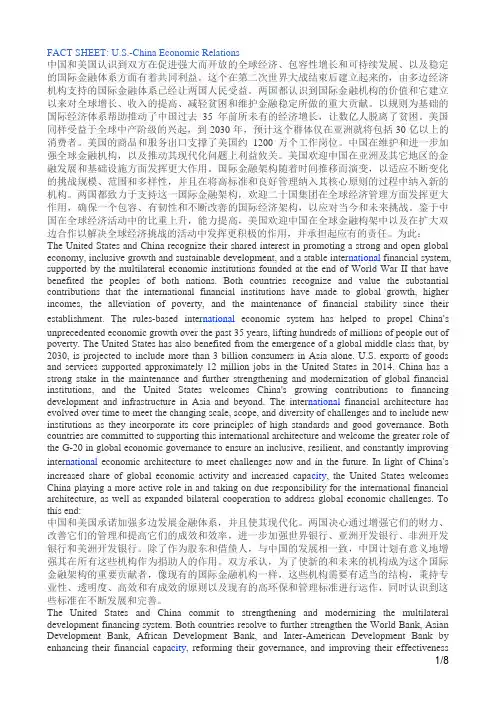
FACT SHEET: U.S.-China Economic Relations中国和美国认识到双方在促进强大而开放的全球经济、包容性增长和可持续发展、以及稳定的国际金融体系方面有着共同利益。
这个在第二次世界大战结束后建立起来的,由多边经济机构支持的国际金融体系已经让两国人民受益。
两国都认识到国际金融机构的价值和它建立以来对全球增长、收入的提高、减轻贫困和维护金融稳定所做的重大贡献。
以规则为基础的国际经济体系帮助推动了中国过去35年前所未有的经济增长,让数亿人脱离了贫困。
美国同样受益于全球中产阶级的兴起,到2030年,预计这个群体仅在亚洲就将包括30亿以上的消费者。
美国的商品和服务出口支撑了美国约1200万个工作岗位。
中国在维护和进一步加强全球金融机构,以及推动其现代化问题上利益攸关。
美国欢迎中国在亚洲及其它地区的金融发展和基础设施方面发挥更大作用。
国际金融架构随着时间推移而演变,以适应不断变化的挑战规模、范围和多样性,并且在将高标准和良好管理纳入其核心原则的过程中纳入新的机构。
两国都致力于支持这一国际金融架构,欢迎二十国集团在全球经济管理方面发挥更大作用,确保一个包容、有韧性和不断改善的国际经济架构,以应对当今和未来挑战。
鉴于中国在全球经济活动中的比重上升,能力提高,美国欢迎中国在全球金融构架中以及在扩大双边合作以解决全球经济挑战的活动中发挥更积极的作用,并承担起应有的责任。
为此:The United States and China recognize their shared interest in promoting a strong and open global economy, inclusive growth and sustainable development, and a stable inter national financial system, supported by the multilateral economic institutions founded at the end of World War II that have benefited the peoples of both nations. Both countries recognize and value the substantial contributions that the international financial institutions have made to global growth, higher incomes, the alleviation of poverty, and the maintenance of financial stability since their establishment. The rules-based inter national economic system has helped to propel China’s unprecedented economic growth over the past 35 years, lifting hundreds of millions of people out of poverty. The United States has also benefited from the emergence of a global middle class that, by 2030, is projected to include more than 3 billion consumers in Asia alone. U.S. exports of goods and services supported approximately 12 million jobs in the United States in 2014. China has a strong stake in the maintenance and further strengthening and modernization of global financial institutions, and the United States welcomes China's growing contributions to financing development and infrastructure in Asia and beyond. The inter national financial architecture has evolved over time to meet the changing scale, scope, and diversity of challenges and to include new institutions as they incorporate its core principles of high standards and good governance. Both countries are committed to supporting this international architecture and welcome the greater role of the G-20 in global economic governance to ensure an inclusive, resilient, and constantly improving inter national economic architecture to meet challenges now and in the future. In light of China’s increased share of global economic activity and increased capa city, the United States welcomes China playing a more active role in and taking on due responsibility for the international financial architecture, as well as expanded bilateral cooperation to address global economic challenges. To this end:中国和美国承诺加强多边发展金融体系,并且使其现代化。
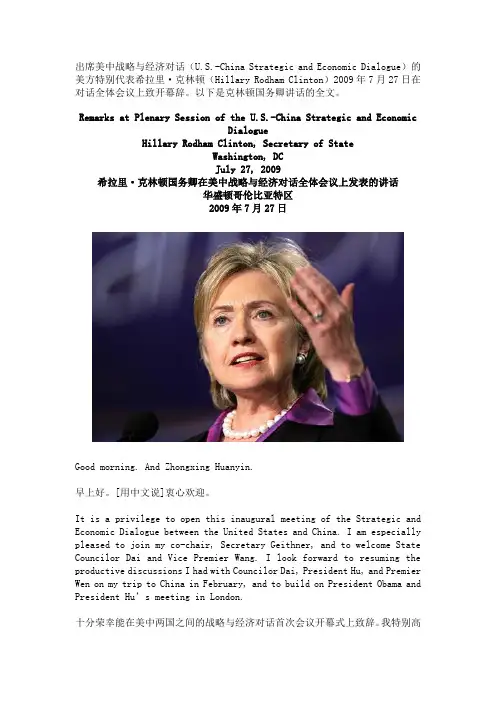
出席美中战略与经济对话(U.S.-China Strategic and Economic Dialogue)的美方特别代表希拉里·克林顿(Hillary Rodham Clinton)2009年7月27日在对话全体会议上致开幕辞。
以下是克林顿国务卿讲话的全文。
Remarks at Plenary Session of the U.S.-China Strategic and EconomicDialogueHillary Rodham Clinton, Secretary of StateWashington, DCJuly 27, 2009希拉里·克林顿国务卿在美中战略与经济对话全体会议上发表的讲话华盛顿哥伦比亚特区2009年7月27日Good morning. And Zhongxing Huanyin.早上好。
[用中文说]衷心欢迎。
It is a privilege to open this inaugural meeting of the Strategic and Economic Dialogue between the United States and China. I am especially pleased to join my co-chair, Secretary Geithner, and to welcome State Councilor Dai and Vice Premier Wang. I look forward to resuming the productive discussions I had with Councilor Dai, President Hu, and Premier Wen on my trip to China in February, and to build on President Obama and President Hu’s meeting in London.十分荣幸能在美中两国之间的战略与经济对话首次会议开幕式上致辞。
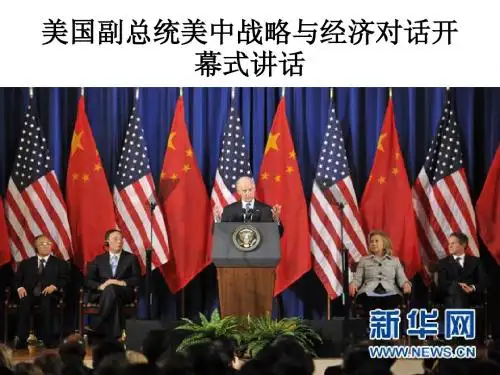
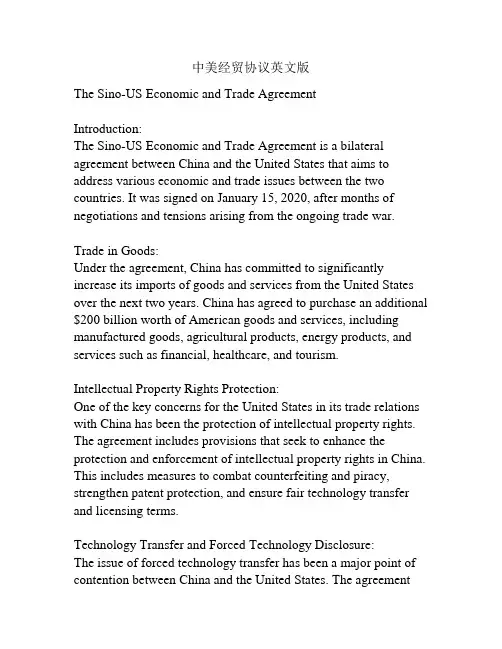
中美经贸协议英文版The Sino-US Economic and Trade AgreementIntroduction:The Sino-US Economic and Trade Agreement is a bilateral agreement between China and the United States that aims to address various economic and trade issues between the two countries. It was signed on January 15, 2020, after months of negotiations and tensions arising from the ongoing trade war. Trade in Goods:Under the agreement, China has committed to significantly increase its imports of goods and services from the United States over the next two years. China has agreed to purchase an additional $200 billion worth of American goods and services, including manufactured goods, agricultural products, energy products, and services such as financial, healthcare, and tourism.Intellectual Property Rights Protection:One of the key concerns for the United States in its trade relations with China has been the protection of intellectual property rights. The agreement includes provisions that seek to enhance the protection and enforcement of intellectual property rights in China. This includes measures to combat counterfeiting and piracy, strengthen patent protection, and ensure fair technology transfer and licensing terms.Technology Transfer and Forced Technology Disclosure:The issue of forced technology transfer has been a major point of contention between China and the United States. The agreementaddresses this concern by prohibiting the forced transfer of technology by the Chinese government or any Chinese entity. It also includes provisions to prevent the unauthorized disclosure of trade secrets and confidential business information.Currency Manipulation:Accusations of currency manipulation have been another source of tension between the two countries. The agreement includes commitments from China to refrain from competitive devaluation of its currency, maintain transparency in its exchange rate policies, and refrain from using exchange rates for unfair competitive advantage.Financial Services and Market Access:The agreement also seeks to improve market access for US financial institutions in China. It includes commitments from China to remove certain barriers to foreign ownership of financial services companies, streamline the regulatory approval process, and enhance protections for intellectual property in the financial services sector.Dispute Resolution:To address any potential disputes arising from the agreement, a strong dispute resolution mechanism has been put in place. This includes a bilateral consultation process and the establishment of a dispute resolution panel to address any issues that cannot be resolved through consultations.Conclusion:The Sino-US Economic and Trade Agreement is a significant stepforward in addressing the economic and trade issues between China and the United States. It seeks to promote fair and reciprocal trade, protect intellectual property rights, address concerns about forced technology transfer, and enhance market access. While the agreement is considered a positive development, its long-term impact on the bilateral trade relationship between the two countries remains to be seen.。
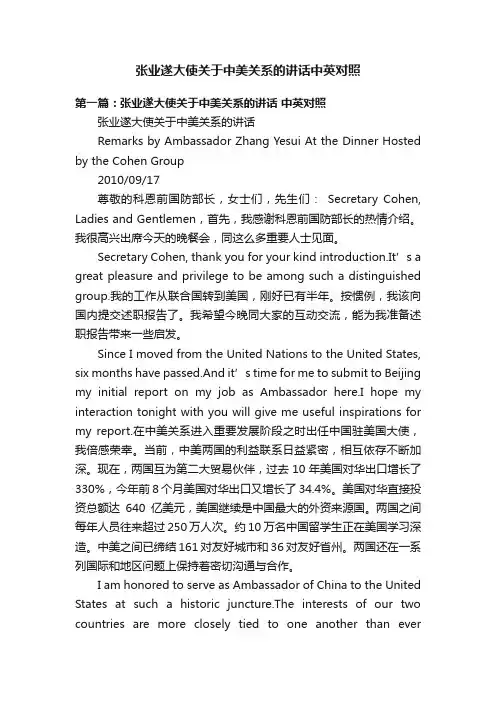
张业遂大使关于中美关系的讲话中英对照第一篇:张业遂大使关于中美关系的讲话中英对照张业遂大使关于中美关系的讲话Remarks by Ambassador Zhang Yesui At the Dinner Hosted by the Cohen Group2010/09/17尊敬的科恩前国防部长,女士们,先生们:Secretary Cohen, Ladies and Gentlemen,首先,我感谢科恩前国防部长的热情介绍。
我很高兴出席今天的晚餐会,同这么多重要人士见面。
Secretary Cohen, thank you for your kind introduction.It’s a great pleasure and privilege to be among such a distinguished group.我的工作从联合国转到美国,刚好已有半年。
按惯例,我该向国内提交述职报告了。
我希望今晚同大家的互动交流,能为我准备述职报告带来一些启发。
Since I moved from the United Nations to the United States, six months have passed.And it’s time for me to submit to Beijing my initial report on my job as Ambassador here.I hope my interaction tonight with you will give me useful inspirations for my report.在中美关系进入重要发展阶段之时出任中国驻美国大使,我倍感荣幸。
当前,中美两国的利益联系日益紧密,相互依存不断加深。
现在,两国互为第二大贸易伙伴,过去10年美国对华出口增长了330%,今年前8个月美国对华出口又增长了34.4%。
美国对华直接投资总额达640亿美元,美国继续是中国最大的外资来源国。
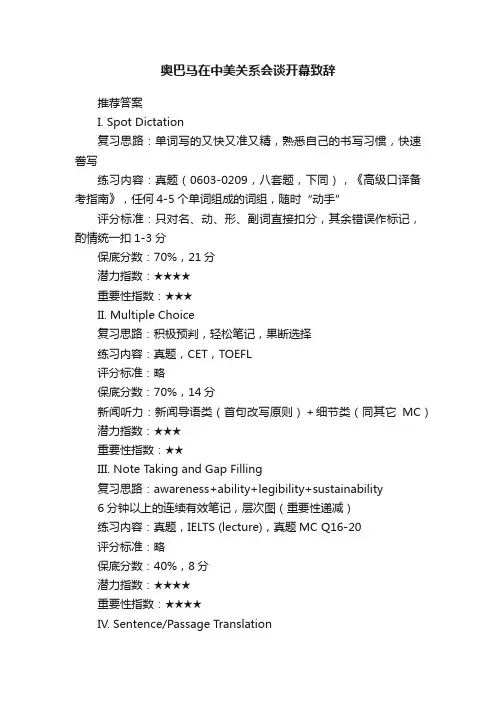
奥巴马在中美关系会谈开幕致辞推荐答案I. Spot Dictation复习思路:单词写的又快又准又精,熟悉自己的书写习惯,快速誊写练习内容:真题(0603-0209,八套题,下同),《高级口译备考指南》,任何4-5个单词组成的词组,随时“动手”评分标准:只对名、动、形、副词直接扣分,其余错误作标记,酌情统一扣1-3分保底分数:70%,21分潜力指数:★★★★重要性指数:★★★II. Multiple Choice复习思路:积极预判,轻松笔记,果断选择练习内容:真题,CET,TOEFL评分标准:略保底分数:70%,14分新闻听力:新闻导语类(首句改写原则)+细节类(同其它MC)潜力指数:★★★重要性指数:★★III. Note Taking and Gap Filling复习思路:awareness+ability+legibility+sustainability6分钟以上的连续有效笔记,层次图(重要性递减)练习内容:真题,IELTS (lecture),真题MC Q16-20评分标准:略保底分数:40%,8分潜力指数:★★★★重要性指数:★★★★IV. Sentence/Passage Translation复习思路:练习量+复述+句式概括+熟练笔记练习内容:真题(包括MC, Q16-20),Roy讲义(分类句式),《中级口译备考指南》,《高级口译备考指南》评分标准:基本句子框架50%,细节补充50%保底分数:60%,18分潜力指数:★★★★重要性指数:★★★★★一句话概括口译听力训练整体思路:“听得懂、记得下、记得住、说得快”-听得懂复习思路:背景知识熟悉,新闻套路熟练,听力有效词汇量,适应各类发音现象练习内容:CNN,BBC,NPR及类似难度的精听训练,听抄(dictation),CET6词汇(主动筛选)--听力有效词汇精听的步骤:(见Roy讲义)-记得下复习思路:个人笔记习惯训练,属于自己的笔记符号,熟悉常考套路练习内容:Roy讲义-记得住复习思路:以复述强化短期记忆,源语言复述(两种思路),目标语言复述练习内容:任何语言输入,包括中文,以30-60秒为单位口译证书考试——笔试、阅读复习纲要题型考察:1. 全文总结能力ma in idea, best title, the author’s tone2. 部分总结能力举例、数据、引用、对比、比喻等写作手法的释义3. 信息定位能力对相应句子的paraphrase4. 综合推断能力“Which of the following is NOT true?” “Which of the following is true but not directly mentioned?”…做好高口阅读的几个关键点:1.相关利益人(stake-holders)概念的培养(mapping)基本立场判断,以“政府计划对大学生助学贷款实行社会化、私有化”这一话题为例相关大学生/家庭,父母放贷机构(赢利机构,利益集团)政府主管部门/协调者/监督者反对派/反对者其他观点持有者横向、纵向比较(以史为鉴,以邻为鉴)2.批判性思维(critical thinking)习惯的培养对政府的监督约束对以盈利为导向的利益团体的行为与政策,加以监督约束对相对弱势,信息不对称的群体,更多关注,保护“I can do nothing else but to voice my care for you.”3.基本写作思路引出观点(直接法,举例法,让步法,…)更具体地介绍报道,政策细节,产品研发过程,特点,理论假说阐述,事件始末(陈述,引用,定义,分类)相关利益人陈述(引用,对比,举例,比喻,类比,数据)作者述评(中立,客观,批判)4.重要句式总结(见Roy讲义p40 reading policies)5.常见话题总结6.政府新政策(政策法规变更)7.写作(阅读)套路A政府推出B政策,出于…原因阐述解释政策,出台过程相关利益人的反应,“各执一词”作者进行评论,横向纵向分析评论结论,审视,怀疑,弊大于利,弊端不容忽视,8.以往真题涉及内容-对烟草业暂缓加税-扶持某机构进行临床用干细胞研究-出台新的旨在减少青少年吸毒的政策-服刑人员实行早九晚五制度-警方开展改善黑人警察形象的行动-新产品,新科技9.写作(阅读)套路A研究机构B专家对C话题进行研究并有所发现(产品,理论,假说,实际运用)“a room of scholars…”, “turf war”实际推广的压力(成本,法规,公众认知)凡涉及克隆、环保等话题的典型观点“What is medically possible may not be ethically wise.” 新保守主义观点10.以往真题涉及内容美国总统奥巴马在中美关系会谈开幕致辞(中英文)各位早上好。
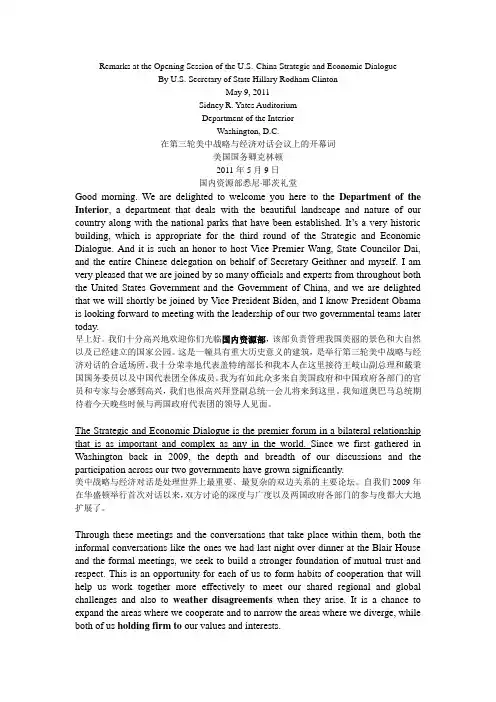
Remarks at the Opening Session of the U.S.-China Strategic and Economic DialogueBy U.S. Secretary of State Hillary Rodham ClintonMay 9, 2011Sidney R. Y ates AuditoriumDepartment of the InteriorWashington, D.C.在第三轮美中战略与经济对话会议上的开幕词美国国务卿克林顿2011年5月9日国内资源部悉尼∙耶茨礼堂Good morning. We are delighted to welcome you here to the Department of the Interior, a department that deals with the beautiful landscape and nature of our country along with the national parks that have been established. It’s a very historic building, which is appropriate for the third round of the Strategic and Economic Dialogue. And it is such an honor to host Vice Premier Wang, State Councilor Dai, and the entire Chinese delegation on behalf of Secretary Geithner and myself. I am very pleased that we are joined by so many officials and experts from throughout both the United States Government and the Government of China, and we are delighted that we will shortly be joined by Vice President Biden, and I know President Obama is looking forward to meeting with the leadership of our two governmental teams later today.早上好。
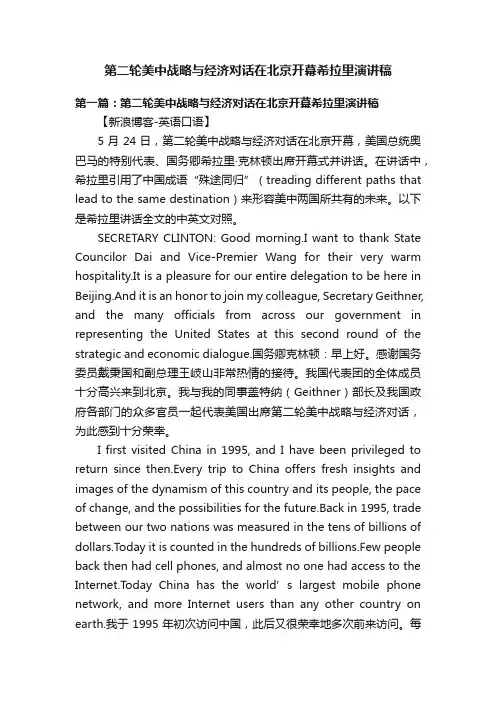
第二轮美中战略与经济对话在北京开幕希拉里演讲稿第一篇:第二轮美中战略与经济对话在北京开幕希拉里演讲稿【新浪博客-英语口语】5月24日,第二轮美中战略与经济对话在北京开幕,美国总统奥巴马的特别代表、国务卿希拉里·克林顿出席开幕式并讲话。
在讲话中,希拉里引用了中国成语“殊途同归”(treading different paths that lead to the same destination)来形容美中两国所共有的未来。
以下是希拉里讲话全文的中英文对照。
SECRETARY CLINTON: Good morning.I want to thank State Councilor Dai and Vice-Premier Wang for their very warm hospitality.It is a pleasure for our entire delegation to be here in Beijing.And it is an honor to join my colleague, Secretary Geithner, and the many officials from across our government in representing the United States at this second round of the strategic and economic dialogue.国务卿克林顿:早上好。
感谢国务委员戴秉国和副总理王岐山非常热情的接待。
我国代表团的全体成员十分高兴来到北京。
我与我的同事盖特纳(Geithner)部长及我国政府各部门的众多官员一起代表美国出席第二轮美中战略与经济对话,为此感到十分荣幸。
I first visited China in 1995, and I have been privileged to return since then.Every trip to China offers fresh insights and images of the dynamism of this country and its people, the pace of change, and the possibilities for the future.Back in 1995, trade between our two nations was measured in the tens of billions of dollars.Today it is counted in the hundreds of billions.Few people back then had cell phones, and almost no one had access to the Internet.Toda y China has the world’s largest mobile phone network, and more Internet users than any other country on earth.我于1995年初次访问中国,此后又很荣幸地多次前来访问。
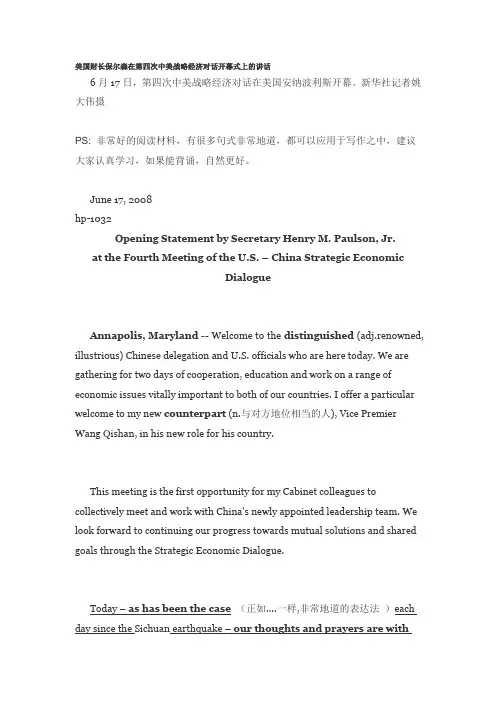
美国财长保尔森在第四次中美战略经济对话开幕式上的讲话6月17日,第四次中美战略经济对话在美国安纳波利斯开幕。
新华社记者姚大伟摄PS: 非常好的阅读材料,有很多句式非常地道,都可以应用于写作之中,建议大家认真学习,如果能背诵,自然更好。
June 17, 2008hp-1032Opening Statement by Secretary Henry M. Paulson, Jr.at the Fourth Meeting of the U.S. – China Strategic EconomicDialogueAnnapolis, Maryland -- Welcome to the distinguished (adj.renowned, illustrious) Chinese delegation and U.S. officials who are here today. We are gathering for two days of cooperation, education and work on a range of economic issues vitally important to both of our countries. I offer a particular welcome to my new counterpart (n.与对方地位相当的人), Vice Premier Wang Qishan, in his new role for his country.This meeting is the first opportunity for my Cabinet colleagues to collectively meet and work with China's newly appointed leadership team. We look forward to continuing our progress towards mutual solutions and shared goals through the Strategic Economic Dialogue.Today –as has been the case(正如....一样,非常地道的表达法)each day since the Sichuan earthquake –our thoughts and prayers are withthe Chinese people as they work to meet the challenges resulting from this terrible tragedy. (建议背诵此句)As President Bush has said, the United States stands ready to help in any way possible, including helping China to rebuild the devastated area.The U.S. – China economic relationship is complex, broad and important to both our countries and to the world economy. The U.S.-China relationship has become central to (对...极为重要的)each nation's interest and to maintaining a stable, secure and prosperous global economic system. Through the on-going, dynamic (adj.active )and respectful discussions of the SED, the relationship is growing in a positive direction. The SED has brought concrete( adj. substantial,tangible)progress on issues important to the U.S., Chinese and global economy faster than would have been possible otherwise (adv.用别的方法, 不同地, 注意这种表达法,非常地道).At this meeting, we will build on(把...建立于,以...为基础)previous progress, including landmark (estone ) agreements on food, feed and product safety announced at our December SED meeting in Beijing. In December, we announced that the U.S. will provide technical assistance for China to develop and implement a nationwide SO2 emission trading program in the power sector and that we have signed a memorandum of understanding (谅解备忘录) to combat illegal logging. The SED has also led to a civil aviation agreement that resulted in(引起, 导致,注意和result from 的区别)a new non-stop flight between Atlanta and Shanghai this past March, and a new group-leisure travel agreement that is estimated to bring up to 100 million Chinese travelers to the United States over the next 15 years.These are a few examples of success resulting from on-going collaboration through the SED, and candid high-level discussions and understanding each other's priorities and interests. By definition, the U.S. – China economic relationship is complex, yet the complexity has not interfered with(干预, 阻挠, 妨碍)our ability to build a base of trust. The United States and China don't always agree on economic issues. Sometimes we may even disagree quite strongly, but we keep talking. That was the purpose of establishing the SED –to keep this most important and complex relationship on an even keel(平稳的; 稳定的)even in times of tension.At this week's meeting, we will have a robust( adj. potent) discussion of our economic relationship as we envision (v.fancy,visualise) a future of sustainable economic growth. We will look at managing financial and macroeconomic cycles. Both the United States and the Chinese economies face current challenges, including higher energy and food prices. The United States is working through a housing market correction and re-pricing of risk in credit markets. China is grappling with (尽力克服) rising inflation and growing internal and external macroeconomic imbalances.The state of our economies affects our people, and affects world prosperity. As we manage through the current challenges, we must also focus on thelong-term fundamentals that underlie sustainable growth in both our nations. During the course of these two days, I will highlight( n.stress, accent, underline) how free trade, competition and open economies are essential. Openness and trade create jobs and opportunities for people to rise out of poverty(脱贫), and are necessary for economic growth and stability – in both China and in the United States.And we will discuss the steps needed to ensure that our countries and the world economy remain open to trade. We will discuss the best way to promote and protect bilateral investment and to counter(vt. 对抗, 反驳) protectionist pressures. We will discuss how open and competitive financial markets, including currency markets, are more resilient in times of turmoil and more vibrant and efficient in supporting balanced economic growth.(注意这几个形容词)Both China and the United States want to enhance innovation and encourage development of intellectual property-intensive industries (注意intensive的用法,比如capital-intensive industry资本密集工业). At the same time, we must protect intellectual property rights (保护知识产权), further (v.advance注意是动词,而非形容词),transparency and rule of law (法治), and stop the global trade in fake products. We will discuss ouron-going efforts in these areas, as well as efforts to improve food and product quality and safety, and support green energy and environmental product markets.We will also discuss the structural imbalances and the saving rate challenge facing each of our economies. In the United States our saving rate is too low. In China it is too high. In order to effectively deal with this issue, we must address how to adequately provide for (为…作准备)our aging populations, including the role of private and public insurance and financing for social services such as health care and retirement.Finally, we will also advance (v.promote) joint opportunities for cooperation on energy security and the environment. As the two largest netimporters of oil, China and the United States face similar challenges as demand for energy increases, and the global production capacity has remained relatively flat for the past ten years.We have a strong and shared interest in avoiding supply disruptions, increasing energy efficiency, promoting the efficiency and transparency of the global energy markets to the benefit of (对…有利) all oil importing nations, and expanding the availability and use of alternative energy sources(可替代能源). We will continue working together on joint efforts already inplace(在适当的位置), such as a five-year commitment to promote alternative fuel technologies for vehicles, and explore new possibilities.We will address many of these through the framework of ten years of cooperation on energy and environmental issues announced at our December SED meeting. Since December, we have been adding details to this framework and I am pleased with the possibilities for innovation and cooperation ahead of us.Significant opportunity exists for the United States and China to achieve immediate progress and make long-term strides towards energy security and environmental sustainability. Through a ten year framework of cooperation, I believe that we have the foundation to meet these challenges.Our meetings today and tomorrow will move the United States and China even further forward to a stronger economic future. Again, welcome to our new Chinese colleagues. We are building upon a shared vision that is possiblebecause of our cooperation, and feasible because of our commitment to the prosperity of our people. (建议背诵)Thank you.intellectual property rights 知识产权王岐山脱稿演讲全文2008年06月22日18:0221世纪经济报道【大中小】【打印】美国东部时间18日晚上,由美中贸易全国委员会、美国商会及美中关系全国委员会共同主办的晚宴上,王岐山受邀做主题演讲。
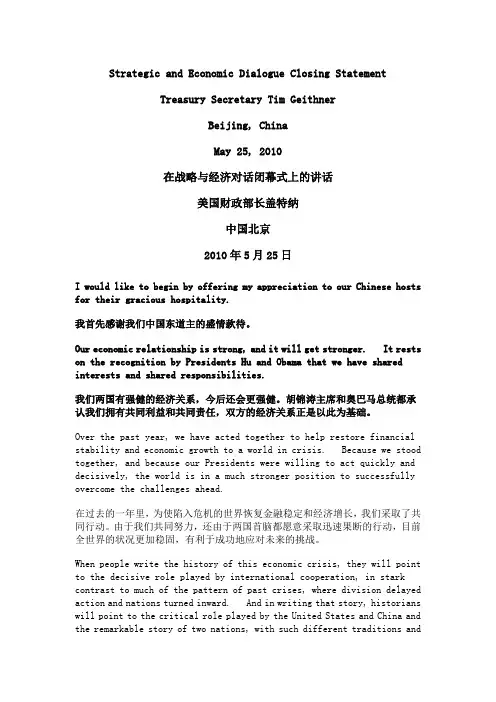
Strategic and Economic Dialogue Closing StatementTreasury Secretary Tim GeithnerBeijing, ChinaMay 25, 2010在战略与经济对话闭幕式上的讲话美国财政部长盖特纳中国北京2010年5月25日I would like to begin by offering my appreciation to our Chinese hosts for their gracious hospitality.我首先感谢我们中国东道主的盛情款待。
Our economic relationship is strong, and it will get stronger. It rests on the recognition by Presidents Hu and Obama that we have shared interests and shared responsibilities.我们两国有强健的经济关系,今后还会更强健。
胡锦涛主席和奥巴马总统都承认我们拥有共同利益和共同责任,双方的经济关系正是以此为基础。
Over the past year, we have acted together to help restore financial stability and economic growth to a world in crisis. Because we stood together, and because our Presidents were willing to act quickly and decisively, the world is in a much stronger position to successfully overcome the challenges ahead.在过去的一年里,为使陷入危机的世界恢复金融稳定和经济增长,我们采取了共同行动。
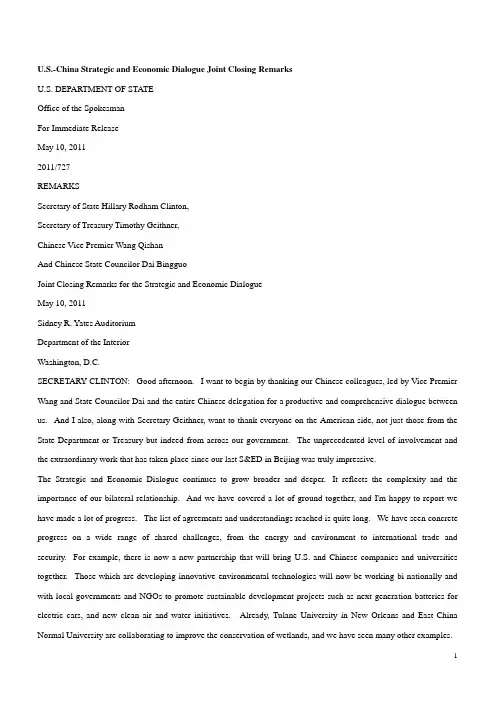
U.S.-China Strategic and Economic Dialogue Joint Closing RemarksU.S. DEPARTMENT OF STATEOffice of the SpokesmanFor Immediate ReleaseMay 10, 20112011/727REMARKSSecretary of State Hillary Rodham Clinton,Secretary of Treasury Timothy Geithner,Chinese Vice Premier Wang QishanAnd Chinese State Councilor Dai BingguoJoint Closing Remarks for the Strategic and Economic DialogueMay 10, 2011Sidney R. Yates AuditoriumDepartment of the InteriorWashington, D.C.SECRETARY CLINTON: Good afternoon. I want to begin by thanking our Chinese colleagues, led by Vice Premier Wang and State Councilor Dai and the entire Chinese delegation for a productive and comprehensive dialogue between us. And I also, along with Secretary Geithner, want to thank everyone on the American side, not just those from the State Department or Treasury but indeed from across our government. The unprecedented level of involvement and the extraordinary work that has taken place since our last S&ED in Beijing was truly impressive.The Strategic and Economic Dialogue continues to grow broader and deeper. It reflects the complexity and the importance of our bilateral relationship. And we have covered a lot of ground together, and I'm happy to report we have made a lot of progress. The list of agreements and understandings reached is quite long. We have seen concrete progress on a wide range of shared challenges, from the energy and environment to international trade and security. For example, there is now a new partnership that will bring U.S. and Chinese companies and universities together. Those which are developing innovative environmental technologies will now be working bi-nationally and with local governments and NGOs to promote sustainable development projects such as next generation batteries for electric cars, and new clean air and water initiatives. Already, Tulane University in New Orleans and East China Normal University are collaborating to improve the conservation of wetlands, and we have seen many other examples.We are also laying the groundwork for potentially significant future collaboration on development, from working together to innovate and distribute clean cookstoves and fuels to strengthening public health systems in developing countries. And our people-to-people programs continue to expand, most notably our "100,000 Strong" Student Exchange Initiative, which has already raised the stated goal of dollars to go along with the very generous Chinese Government support for 20,000 American students because all of us are committed to increase more people-to-people interactions and opportunities. Now, I am well aware that these specific and very substantive partnerships may not produce major headlines, but I think they do reflect our shared commitment to translate the high-level sentiments and rhetoric of these diplomatic encounters to real world benefits for our citizens, our countries, and the wider world.Just as important, although perhaps even harder to quantify, are the habits of cooperation and mutual respect that we've formed through these discussions. We believe that to keep our relationship on a positive path, as foreseen by Presidents Obama and Hu, the United States and China have to be honest about our differences and address them firmly and forthrightly. At the same time, we are working together to expand the areas where we cooperate and narrow the areas where we diverge. And we are building up a lot more understanding and trust. So we discussed everything, and whether it was something that was sensitive to us or sensitive to them, all the difficult issues, including human rights. And we both have made our concerns very clear to the other. We had candid discussions on some of our most persistent challenges, from addressing North Korea and Iran to rebalancing the global economy.We agreed on the importance of cooperating in Afghanistan to advance common goals of political stability and economic renewal. We established a new U.S.-China consultation on the Asia-Pacific region, where we share a wide range of common interests and challenges. And for the first time in these dialogues, senior military and defense leaders from both sides sat down face to face in an effort to further our understanding, to develop trust, and avoid misunderstandings that can lead to dangerous miscalculations. This new strategic security dialogue is a very important step forward, and we think it will add immeasurably to our bilateral relationship.As we have discussed these issues and as we have committed to keeping the relationship moving forward, we have some milestones ahead of us. For the first time, President Obama plans to participate in this year's East Asia Summit. And Vice President Biden will travel to China this summer, continuing our discussions on the full range of shared regional and global challenges. And he hopes to return the hospitality by welcoming Vice President Xi Jinping to Washington at a later date. I look forward to seeing our Chinese partners at the ASEAN Regional Forum in Indonesia, and both the President and I and the Secretary are greatly anticipating the United States hosting APEC in Hawaii.Now, those are just a few of the highlights. But day to day, at every level of our governments, we are working hard tobuild that positive, cooperative, comprehensive relationship that our two presidents have asked for. This is the long, hard, unglamorous work of diplomacy. At our plenary sessions that State Councilor Dai and I chaired yesterday, there was a dizzying array of issues that we are working on together, and I felt very satisfied because that was not the case two years ago. And I anticipate that we are going to see further progress, because we want to realize the full promise of our partnership, and we very fervently hope to leave a more peaceful and prosperous world for our children and our children's children.So let me again thank our Chinese friends for making this long journey and for working as we move forward on our journey together into the future.Now, I am pleased to turn to my colleague and partner, Secretary Geithner.SECRETARY GEITHNER: Thank you, Secretary Clinton. Let me outline the highlights of our discussions on the economic side.We had a very comprehensive discussion about a full range of economic issues between us and facing the global economy. As always, we reviewed the major risk and challenges to our - to growth domestically in China and the United States, and we talked about the major risks and challenges on the global economic front. We talked about the investment climate in both countries. We talked about energy policy, financial reform - very comprehensive discussions. And we benefited on the U.S. and on the Chinese side from an exceptionally talented and very senior delegation of financial exports - experts, members of the cabinet, regulators, et cetera. And that's very important. Now, our three key objectives on the U.S. side were: first, to encourage the ongoing transformation of the Chinese economy away from its export-dependent growth model of the past to a more balanced growth strategy led by domestic demand; to encourage China to level the competitive playing field between U.S. and Chinese companies, both in China and around the world; and to strengthen our engagement with China on financial reform issues in both countries.And we have made very, very significant progress in our economic relationship over the past two years. Our exports to China reached $110 billion last year and are growing about 50 percent faster than our exports to the rest of the world. And those exports are all the things Americans create and build - from agriculture, all sectors of manufacturing, services, and advanced technology - and they support hundreds of thousands of jobs across the United States.Now, overall, we are seeing very promising shifts in the direction of Chinese economic policy. First on the exchange rate, since last June, as you know, the Chinese currency, the Renminbi, has appreciated against the dollar by more than 5 percent, and at an annual rate of about 10 percent when you take into account the fact that Chinese inflation is significantly faster than that in the United States.We hope that China moves to allow the exchange rate to appreciate more rapidly and more broadly against thecurrencies of all its trading partners. And this adjustment, of course, is critical not just to China's ongoing efforts to contain inflationary pressures and to manage the risks that capital inflows bring to credit and asset markets, but also to encourage this broad shift to a growth strategy led by domestic demand.China has outlined in its Five-Year Plan a comprehensive set of reforms, again, to shift its growth strategy away from one relying on exports to domestic demand. China has joined a broad commitment with other countries in the G-20 to put in place mechanisms to reduce the risk that we see once again the emergence of large, external imbalances that could threaten future financial stability and future economic growth.This process is going to take time, and of course, it's going to require a sustained effort of reform. But of course, it's essential to the future health of the global economy and the trajectory of future growth in China. Again, we're seeing progress here, too. If you just step back from and look, China's current account surplus as a percent of GDP peaked at about 10 percent before the crisis. It's now around 5 percent, and of course, we'd like to see that progress sustained. This brings me to the third area, the third area of focus in our discussions, which is how to create a more level playing field. In our meetings over the last few days, we've seen some very important steps towards that goal, and let me just review a few of them. First, China committed to making long-term improvements in its high-level protection of intellectual property rights and enforcement regime to strengthen the inspection of government software and use at all levels of government. And this will help protect U.S. innovators as well as Chinese innovators in all industries, not just in software. And I think that's very important.China also confirmed that it will no longer employ government procurement preferences for indigenous innovation products at any level of government. And this is important to make sure, of course, that U.S. technology, U.S. firms, can compete fairly for business opportunities in China.China has committed to increased transparency, requiring government authorities to publish regulations at least 30 days in advance, so again, that U.S. firms, all foreign firms, have the chance to see those informations - see those regulations in draft and they have the opportunity for input just as their Chinese counterparts do.China and the United States, recognizing the importance of transparency and fairness in export credit policies, have agreed to undertake discussions on export - on the terms of our respective export credit policies. And this is important, of course, because China, by some measures, is the largest provider of export credit on - in the world.And finally, we've been discussing with the Chinese authorities the important objective of how to make sure that companies in China that compete with state-owned enterprises are not put at a broader disadvantage.The final focus of our discussions on the economic side was China's ongoing financial reforms to create a more open, more flexible, more dynamic, more developed financial system. And these reforms, which are designed to increase thereturns to savers, to further develop China's equity and bond markets, and to expand opportunities for foreign financial institutions in China are very important and very promising, not just, of course, in expanding opportunities for U.S. institutions but also reinforcing this broad shift in strategy by the Chinese Government towards a growth strategy led by domestic demand.Now, when President Hu visited Washington in January, President Obama described the evolution of our relationship as - quote - "a healthy competition that spurs both countries to innovate and become even more competitive." And of course, just as China faces significant economic challenges at home, we have our challenges in the United States, too. And we are working very hard not just to repair the damage caused by this financial crisis, but to make sure that as we restore fiscal sustainability, as we return to living within our means as a country, we're making sure we preserve the capacity to invest in things that are going to be critical to the future strength of the American economy. And I can say, based on the strength of our conversations and the strength of this emerging relationship, that this economic relationship with China is - will continue to grow, continue to deepen, and continue to provide tremendous opportunities for both nations. And you see today concrete, tangible signs of progress on both sides that underscore that commitment of both our presidents.In conclusion, I just want to end where Secretary Clinton began, which is to thank the delegations on both sides, both the American and Chinese participants in these discussions. They brought a directness and candor and, frankly, greater openness than we've seen in the last two years, and I think that is very welcome. And I want to express my personal gratitude to Vice Premier Wang for his leadership in these discussions, and to compliment him for the very substantial changes he's already been able to bring about. Thank you very much.VICE PREMIER W ANG: (Via interpreter) Dear friends from the press, under the guidance of President Hu Jintao and President Obama and thanks to the joint endeavor of the both sides, the third round of China-U.S. Strategic and Economic Dialogues has been a great success. The essential mission of our economic dialogue is to implement the important agreement reached between the two presidents during President Hu Jintao's recent state visit to the United States this past January and to implement the building of China-U.S. comprehensive and mutually beneficial economic partnership.We had in-depth discussions of our overarching strategic and long-term issues in bilateral economic cooperation, and arranged a host of win-win outcomes. Particularly, Secretary Geithner and I signed a China-U.S. comprehensive framework promoting strong, sustainable, and balanced economic growth and economic cooperation. Under the framework, the two countries will carry out an expanded, closer, and a more extensive economic cooperation. We agree that in today's extremely complex economic environment, our two nations should further step up macroeconomicpolicy coordination and communication, and contribute to steady and sound economic growth in both countries.We discussed the implications of European sovereign debt crisis, the nuclear leak disaster triggered by Japan's earthquake, the turbulence in the Middle East for the global economy, and we highlight the international community should work together to ensure strong and a sustainable world economic recovery, to effectively advance the reform of global economic structure, to gradually build a fair and a reasonable international economic order.The two sides agree that in a transformation of our respective growth models and economic restructuring, we will use respective strength and expanded cooperation in railway, power grids, and other infrastructure programs, and in clean energy, green economy, and science and technology innovation, and expand bi-national and the corporate exchanges and cooperation.We highlight our commitment to build a more open trade and investment system. The United States commits to accord China fair treatment in a reform of its export control regime, relax high-tech exports control towards China, and to consult through the JCCT in a cooperative manner to work towards China's market economy status in an expeditious and a comprehensive manner. And the two sides will strengthen cooperation in bilateral investment treaty negotiation and strengthen cooperation in IPR protection, food safety, and product quality. We will advance Doha round negotiations and reject trade and investment protectionism.We also had in-depth discussions of financial cooperation and agreed to strengthen information-sharing and cooperation regarding the regulation of systemically important financial institutions, shadow banking, business, credit rating agencies, the reform of remunerations policy and combating illegal financing, and to jointly advance international financial architecture reform. The United States welcomes Chinese financial institutions to invest in America and to recognize China's enormous progress in capital adequacy ratio, comprehensive consolidation supervision, and the other regulatory aspects. The United States commits to further enforce strong supervision of government-sponsored enterprises and to make sure they have enough capital to fulfill financial obligations. Knowing oneself and each other is an important prerequisite for cooperation. In the economic dialogue, we increased our mutual understanding, expanded consensus, and arranged outcomes. This will give a strong boost to the growth of the China-U.S. comprehensive partnership based on mutual respect and mutual benefit.I thank you, everyone, and I would like to thank Secretary Geithner and Secretary Clinton and the U.S. team for all the work you have done for a successful economic dialogue. Thank you.STA TE COUNCILOR DAI: (Via interpreter) Dear friends from the press, it's a great pleasure to meet with you once again. The China-U.S. Strategic and Economic Dialogues have already completed its third round. For each and every round, we invite friends from the media to come here to draw a successful conclusion, so I'd like to thank you. Thisround of dialogue was held as President Hu Jintao paid a successful state visit to the U.S. earlier this year. The two sides agreed to build a China-U.S. partnership based on mutual respect and mutual benefit.I want to tell you the following: First, on the strategic track, Secretary Clinton and I focused on the agreement of our two leaders and exchanged views on how to build a China-U.S cooperative partnership based on mutual respect and mutual benefit. We had in-depth and practical exchange of views.Our dialogue covered many issues, including China-U.S. bilateral relations, major issues internationally and regionally, and we had a good conversation. We agreed that we must act in accordance with the spirit of the China-U.S. joint statements, work to increase our strategic mutual trust, enhance exchanges at higher levels, have closer dialogue on international and regional issues, and to further increase our people-to-people exchange.We issued an outcome list of the strategic track which covered energy, environment, science, technology, transport, forestry, and climate change cooperations. I said we had a good conversation, and I did not mean that we agreed on each and every issue. However, after each round of dialogues, we successfully expanded our mutual understanding and increased our mutual trust and enhanced our cooperation, and this has added to our confidence of further developing our bilateral relations in the future.Secondly, both of us agreed that we must increase our strategic mutual trust and deepen our practical cooperation. The U.S. had reaffirmed that it welcomes a strong, successful, and a prosperous China that plays a greater role in international affairs, and it does not seek to contain China. It respects China's interests. And both sides reaffirmed their commitment to a peaceful - the Chinese side reaffirmed its commitment to the road of peaceful development, and will not challenge the United States interests.A China-U.S. strategic security dialogue is a very important outcome of this dialogue. We agreed to hold this dialogue within the framework of the Strategic Dialogue, and held its first round of meeting this morning, and the China-U.S. strategic security dialogue will continue to be held in the future. We also talked about further deepening our bilateral cooperation and fostering new areas of cooperation and make our - the pie of our common interests bigger and more tasteful.Thirdly, we agreed that we will work together in the Asia Pacific region so that we can better coordinate with each other and better interact with each other in the Asia Pacific. We agreed that Asia Pacific is broad enough to accommodate the interests of China and of the United States. We must work together in this region, work together with other countries in this region to uphold peace, stability in the Asia Pacific and to promote the sustained prosperity of the Asia Pacific and achieve the common development of all countries in this region so that the Pacific Ocean will become a peaceful one. We agreed that we will set up a consultation mechanism for Asia Pacific region.Fourthly, we both agree that we must work globally and respond to international as well as domestic challenges. Recently, there have been new and important changes in the international situation. For China and the United States as two influential countries, it is important that we have more consultation, coordination, and cooperation in order to promote and safeguard peace, stability, and the prosperity of the world. I wish to tell the friends from the media that the Strategic and Economic Dialogue, since its inception, has played a very important role in enhancing our mutual trust, coordinating our position, and promoting our mutually beneficial cooperation. China is ready to work with the U.S. side to further grow and make good use of this S&ED dialogue and mechanism so that it can better serve China-U.S. relations. On how to make use of this mechanism, I think we are open to the good suggestions and proposals from the friends of the media.To conclude, like Vice Premier Wang Qishan, I would like to thank Secretaries Clinton and Geithner as well as colleagues and staff from China and from the U.S. for your hard work to ensure the success of this round of dialogue. I wish to thank the U.S. side for your thoughtful arrangements and to thank you, friends, from the media for your interest in this dialogue. I'm looking forward to seeing you again in Beijing next year and continue our dialogue. Thank you. (Applause.)第三轮美中战略与经济对话战略轨道会谈结果美国国务院发言人办公室2011年5月10日新闻公报2011年美中战略与经济对话战略轨道会谈结果(Outcomes of the Strategic Track)2011年5月10日在2011年5月9日至10日举行的第三轮美中战略与经济对话(Third Round of the U.S.-China Strategic and Economic Dialogue)框架下进行的战略轨道的对话中,双方讨论了主要的双边、地区性和全球性问题。
全国免费咨询电话:400-0123-267 托福【阅读背景】机经:中美贸易对话 小马过河为大家准备了“托福阅读【背景机经】:中美贸易对话”, 供各位备考托福的考生们参考使用,来提高自己的托福成绩!免费咨询电话:400-0123-267。
Trade issues topped the opening on Wednesday of strategic and economic talks between the United States and China. U.S. business leaders say the high-level talks are an opportunity for U.S. officials to push for lower trade barriers.
在星期三召开的中美战略与经济对话中,贸易问题成为讨论焦点。美商界领袖认为,这次高层会谈是美国官员推动降低贸易壁垒的机会。
Chinese officials say an unexpected drop in trade, both imports and exports, reflects rising labor costs and weak overseas demand -- key concerns for the world's two largest economies as their foreign and finance ministers meet in Washington.
中国官员表示,进出口贸易出于意外的减少,反映了进出口贸易出乎意外的减少反映了不断上升的劳动力成本和海外需求疲软。当美中两国的外交部和财政部部长们在华盛顿举行会谈之际,这是世界两国最大的经济体所关心的关键性问题。
U.S. Vice President Joe Biden, who opened Wednesday's talks, said the US-China relationship is crucial.
The White HouseOffice of the Vice PresidentFor Immediate ReleaseMay 09, 2011Remarks by Vice President Joe Biden to the Opening Session of theU.S.-China Strategic & Economic DialogueDepartment of the Interior Washington, D.C.9:50 A.M. EDTTHE VICE PRESIDENT: Good morning. Thank you. Thank you, all. It’s an honor to welcome back to Washington for the third meeting of the Strategic and Economic Dialogue between the United States and China, two good friends.Let me acknowledge the co-chairs at the outset here. Vice Premier Wang and State Counselor Dai, welcome back. I got an opportunity to spend some time with you -- not as much as my colleagues have -- but your trip with President Hu was a great visit, and we got a chance to spend some time together.The United States co-chairs are our A-Team, our superstars: Secretary Clinton and Secretary Geithner, two of the best America has to offer, so we expect great things to happen. We expect great things to happen with the four of you.Ladies and gentlemen, we each have a number of important tasks in the days ahead and all designed to continue to guide our relationship to an even better place than it’s already moved.I also would like to recognize, by the way, Secretary Gary Locke, the President’s choice to be our next ambassador to China. Gary has served with distinction in the Cabinet, as well as before that serving as the governor of the state of Washington. And I know that once the Senate confirms Gary, and I expect that to be quickly, he’ll do an outstanding job in Beijing.(Applause.) There he is.And I’m not going to mention the Trade Representative sitting next to you because I told him if he was able to deliver a deal on -- with Korea, I would nominate him for the Nobel Peace Prize. (Laughter.) He did and I have to. (Laughter.)Any rate, I’ve made my -- I hate to acknowledge this, gentlemen, but I made my first trip to China as a young man, meeting with Deng Xiaoping in 1979, in April of ’79.I was privileged to be with what I guess I’m now part of, a group of very senior senators at that time.I think we were the first delegation to meet after normalization -- with senators like Jacob Javits of New York, and Frank Church, and a number of other very prominent members.And on that trip when we met with then Vice Premier Deng and witnessed the changes that were being initiated, beginning to spark China’s remarkable -- absolutely remarkable transformation, even back then it was clear that there was -- that great things were happening. And there was also a debate --there was a debate here in the United States and quite frankly throughout most of the West as whether a rising China was in the interest of the United States and the wider world. As a young member of a Foreign Relations Committee, I wrote and I said and I believed then what I believe now: That a rising China is a positive, positive development, not only for China but for America and the world writ large.When President Obama and I took office in January of 2009 we understood -- we understood absolutely clearly that our relationship with China would be a key priority. The President and I were determined -- determined to set the relationship on a stable course that could be sustained for decades. Our two countries, now the world’s two largest economies, were bound by ever-growing ties of commerce and investment. We, the United States, we always talk about what we import; we, the United States, exported $110 billion in American goods and services to China last year.But we’re bound my much more than commerce.Over the last three decades, our people have become increasingly linked through education, through work and through travel. Last year, 130,000 Chinese were studying in the United States. They’re really good.We’re going to try to keep some of them. I’m only joking.I’m only joking.(Laughter.) But they are. (Laughter.)We cannot claim the same number of Americans in China, but our 100,000 Strong Initiative will dramatically increase the number of young Americans living and studying in China. As a matter of fact, my niece who -- excuse me, as we say in the Senate, a point a personal privilege -- who graduated from Harvard not too long ago, works for Secretary Geithner, she did exactly what we hope another 100,000 will do: She studied Chinese and went and lived in China and is now devoted to making sure the relationship gets better and better and better.And we’re linked by our shared global res ponsibilities. We both serve as permanent members of the United Nations Security Council. We’re both Pacific powers.And for many of the world’s pressing challenges, it’s a simple fact, that when the United States and China are not at the table, the sol ution to the problem is less possible than when we are at the table. It’s no exaggeration to say that our relationship and how we manage it will help shape the 21st century.Our commitment starts at the top. Our Presidents have met face-to-face nine times in two and a half years. Nine times. President Hu, as I mentioned, was just here in January for what all would acknowledge was a very successful state visit. I’ll go back to China this summer at the invitation of Vice President Xi, and I’m look ing forward to hosting the Vice President for a reciprocal visit later this year.Even these frequent visits and summits, though, as you all know, are not enough on their own to sustain and build a relationship across our entire government, across all agencies. That's why we’re here. It’s not merely, merely our mil-to-mil or economic issues. We want to build a relationship across the entire spectrum of our governments. That’s why we’ve asked all of you to come together for these dialogues.When President Obama launched the first strategic and economic dialogue in 2009, he issued a challenge to all of us to work together to address some of the defining problems of our time. Some would say that's somewhat presumptuous for China and the United States to decide we’re going to workon the defining problems, but as I said earlier, how we cooperate will define in significant part how we deal with the challenges that the world face in the beginning of the 21st century.This is at the heart of our effort to build a cooperative partnership. We seek to cooperate to advance our mutual interests in not only promoting economic growth that is strong, sustainable and balanced, but trade that is free and is fair. We seek cooperation to advance our mutual interests in the prosperous future that will come from an energy supply that's clean and secure and addresses climate change.And we seek to cooperate to advance our mutual interests in a range of pressing global and regional security challenges. This includes continuing our work to prevent the spread of nuclear weapons and specifically to curb proliferation of those weapons and technology from both Iran and North Korea.Where do we stand two years after the President issued his challenge that we cooperatemore? Through this dialogue and the dedicated efforts of our governments and our people, I believe history will show we’ve made progress.But there's much more to do, and that's why we’re here.Along with our partners in the G20, we’ve worked to sustain global economic recovery. We’ve recognized that the United States-China relations generate global economic benefit, not just to both our countries, but global benefit.Last year our trade with China supported over 500,000 jobs here in the United States, and we made tangible progress during President Hu’s visit, especially in the areas of innovation, intellectual property, and exports, all of which we’re following up on.Over the next two days, we need to build on this momentum and to make sure our commitments are aggressively implemented so we can continue to move.You may have noticed that there is a debate in this nation how best to secure America’s long-term fiscal future. We know that overcoming our economic challenges begin at home. We in the United States have to restore financial stability and we need to make the investments necessary, as well, to win the future. We need to maintain our commitment to what we believe, the President believes, is the pillars of our economic future: education, innovation, and infrastructure.I know that you’re adjusting to your economy in the world situation as well.I know that in China you're working to rebalance your economy and make growth more sustainable, with greater reliance on domestic demand. None of this is easy. But success in re-orienting growth will be not only good for China, in our humble opinion, but it will be good for the United States and for the rest of the world.The United States and China a re the world’s largest producers and consumers of energy and we share the common challenges that flow from that. And this creates not only a problem, but great opportunity -- great opportunity for common efforts to find clean energy solutions. Secretary Chu likes to say -- and I love this expression -- “Science is not a zero-sum game.”Science is not a zero-sum game. That amply is illustrated by the remarkable cooperation we've begun to forge in this area. Let me just mention one example.Our joint Clean Energy Research Center is funding new approaches to energy efficiency, clean coal -- which we both need to deal with -- and clean vehicles. We need to build on and expand our efforts in this area, and I know you’ll be doing -- having much discussion these next two days on that area, and it seems to me an area where there’s potential for great progress.On global security challenges, we've also made progress. President Hu joined us at the Nuclear Security Summit -- in January, we signed the memorandum of understanding to build a center for excellence to promote nuclear security in China. We have cooperated in stemming nuclear proliferation from both Iran and North Korea, including preventing sensitive technologies from being exported to both those countries.The strategic dialogue is important to both our countries. Just look at the agenda that you have for the next two days. It’s a fulsome agenda.To list just a few of the topics on the agenda for the next two days -- and it illustrates the sheer breadth of our relationship: Climate change; clean energy; mil-to-mil operations -- our military relationships; regional issues such as Sudan and Afghanistan.Our goal -- our goal, in part, is to enhance the communication and understanding that we believe, and I believe you believe, will build trust and confidence. We have to be honest with each other. We are not going to agree on everything; we will clearly find areas where there will still be disagreement. But as we work to advance our respective national interest, we have to move on what we seek in common, find the common ground, and I would argue much of our mutual national interest will find common ground. But only by discussing a diverse range of topics, including sensitive ones, can we help mitigate the risk of misperception and miscalculation.My father used to say the only disagreement worse than one that is intended is one that is unintended. That's why it’s so critically important we talk to one another honestly.We should be realistic; we won't always be able to work together. In some areas we have vigorous disagreement. In some we'll have vigorous competition. In still others we'll have vigorous collaboration.But I believe on balance we have much more to agree on than to disagree on, and so does the President believe that. A healthy competition, in our view, is good for both of us. Competition is not bad. Competition that’s healthy is good.This is the reason why I’ve held the view for so many years and continue t o hold the view that a rising China is a positive development. As you might expect, it’s my -- I have overwhelming confidence in the capabilities of the American people. And those capabilities are enhanced when there’s genuine competition from equally capable people. I welcome this healthy and fair competition because I believe we’ll see it will spur us both to innovate and both will benefit from it.As I’ve said earlier, it’s important to be straightforward with one another.There is one area where we have vigorous disagreement. And I know and I understand that disagreement, when we voice it, is upsetting or rankles -- I don’t know how that translates into Chinese -- but how it concerns some of our friends in China. We have vigorous disagreement in the area of human rights.We’ve noted our concerns about the recent crackdown in China, including attacks, arrests and the disappearance of journalists, lawyers, bloggers and artists. And again, no relationship that’s real can be built on a false foundation. Where we disagree, it’s important to state it.We’ll continue to express our views in these issues, as we did in the Human Rights Dialogue in Beijing two weeks ago.Now, look, as I said, I recognize that some in China see our advocacy as -- human rights as an intrusion and Lord only knows what else. But President Obama and I believe strongly, as does the Secretary, that protecting fundamental rights and freedoms such as those enshrined in China’s international commitments, as well as in China’s o wn constitution, is the best way to promote long-term stability and prosperity of any society.The transformation of China’s economy and society since my first trip as a young man in 1979 has truly been breathtaking. I doubt whether it’s occurred at any other period in world history -- it’s been so significant and so rapid. The immense talent of the Chinese people, the incredible hard work and perseverance of the Chinese people and their leaders have literally lifted tens of millions of people out of po verty and built an economy that now helps fuel the world’s prosperity.It’s remarkable.During this same period, the relationship between the United States and China has also seen a remarkable transformation -- again, through the talent, hard work and respected political leaders who have governed our countries over the last three decades.The bonds between our country -- our countries come about through -- have come about through intense engagement from the moment of normalization -- events like this one. We’ve already done much to make our relationship positive, cooperative, and comprehensive. And I’m absolutely confident that we can do more for ourselves and for generations of Americans and Chinese as well.And as I said, presumptuous of me to say this, if that occurs and continues to occur, it will benefit the whole world. So now it’s time to get to work.Again, welcome, gentlemen; welcome to your delegations. And I thank you all for the honor of being able to address you. Thank you very much. (Applause.)END10:07 A.M. EDT。